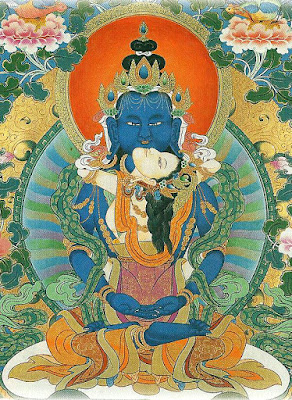I'm talking about The Tibetan Book of the Dead, deluxe edition, with introduction by the Dalai Lama, Penguin Books Ltd, 2005.
Much of the material is outrageously bizarre and peculiar (in my eyes, at the time of reading). For example, here's an excerpt from the Specific Rites for Averting Death:
“When the indication of protruding ankle bones appears, one should face westward towards the sun when it is close to setting and remove one's clothes. Then, placing a dog's tail under oneself, and some dog excrement in a heap in front, one should eat a mouthful and bark like a dog. This should be repeated three times...
“Also in cases where other people are afflicted by illness: if the roots of their teeth grow grimy and black, such a person should wear a goat's skin, face the sunrise, and bleat three times like a goat. Similarly, in cases where the nostrils sag inwards, it will be beneficial if one visualises the syllable A on the tip of the subject's nose, recites the syllable A twenty-one times, and bathes in various rivers...” (Number of rivers not specified.)
 The male and female primordial buddhas Samantabhandra and Samantabhadri in union. Thangkas painted by Shawu Tsering and photographed by Jill Morley Smith are in the private collection of Gyurme Dorje.
The male and female primordial buddhas Samantabhandra and Samantabhadri in union. Thangkas painted by Shawu Tsering and photographed by Jill Morley Smith are in the private collection of Gyurme Dorje. The three fates, Clotho, Lachesis and Atropos, "...who spin, draw out and cut the thread of Life ... as they triumph over the fallen body of Chastity." (Wikipedia 23 April 2014). I don't know what Chastity's got to do with it. Death triumphs over Chastity? Doesn't make sense to me.
The three fates, Clotho, Lachesis and Atropos, "...who spin, draw out and cut the thread of Life ... as they triumph over the fallen body of Chastity." (Wikipedia 23 April 2014). I don't know what Chastity's got to do with it. Death triumphs over Chastity? Doesn't make sense to me.

 MAYA, MIRROR OF ILLUSIONS by A.B. Davies
MAYA, MIRROR OF ILLUSIONS by A.B. Davies